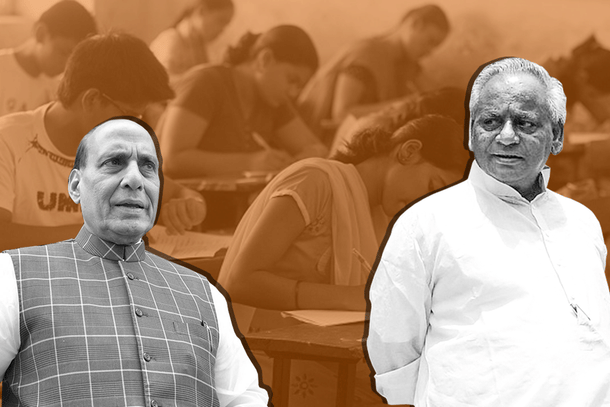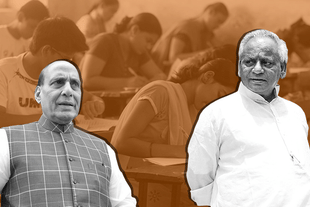News Brief
Why Kalyan Singh's Anti-Copying Act Was More Important Than You Think
Swarajya Staff
Aug 24, 2021, 01:14 PM | Updated 01:14 PM IST
Save & read from anywhere!
Bookmark stories for easy access on any device or the Swarajya app.


The Kalyan Singh government in Uttar Pradesh, in 1992, promulgated the stringent Anti-Copying Act. The ordinance contained a provision that any student found copying would be handcuffed and sent to jail.
Almost 30 years later, today, people who passed their tenth and twelfth in the era still proudly say that they passed the exam during the tenure of Kalyan Singh.
The Anti-Copying Act, 1992 and its effect
The Anti-Copying Act, 1992 was a legislation enacted by the Government of Uttar Pradesh headed by Kalyan Singh of the Bharatiya Janata Party (BJP). The law aimed to end the practice of mass copying in school and university examinations in the state.
The Act made ‘use of unfair means in examinations’ a cognisable offence which was non-bailable and even allowed the police to enter the examination centres to conduct checks and arrest the defaulters.
Due to the strict implementation of the law, 17 per cent of the students who had registered for the tenth and twelfth examination left the examination midway. The effect of that ordinance was such that only 14.70 per cent of intermediate and 30.30 per cent of high school candidates passed the Uttar Pradesh Board exams in 1992.
Why was the Anti-Copying Act brought?
The state of public examinations in Uttar Pradesh was shockingly abysmal. There existed a huge "cheating mafia'' at work, involving officials, teachers, students and even local gangsters. Every thinkable tactic was used by the syndicate to enable the students to pass their board exams.
The problem was not just limited to the examination period, but extended to every stage of the process. Illegal means and material were accessible with ease and available at a pitiable price, be it educational degrees, contracts pertaining to the board’s functioning, allocation of examination centres, granting of board affiliation or appointment of select examiners etc.
Especially in the UP Board examinations, guides, model papers, answer slips, illegal proxy examinees, and outside aid while writing the exams was not an exception, but the norm. Even invigilators and the examiners were part of the cabal. The situation was such that Uttar Pradesh Board then became the first choice for the candidates who were solely dependent on unfair means to pass the examinations.
Kalyan Singh against all odds
In 1991, chief minister Kalyan Singh made Rajnath Singh, a physics lecturer from Gorakhpur, the Education Minister in his government. Both Kalyan Singh and Rajnath Singh had expressed their intentions to establish such a system in the state that only the students who studied for an entire year could pass the examination and copying could be stopped.
Rajnath Singh got the law drafted and the proposal was presented before the cabinet. Initially, almost all the ministers in Kalyan Singh's government turned against it, fearing popular backlash. However, the cabinet had to eventually bow down to Kalyan Singh's persistent advocacy for the same, and the government thus approved the Anti-Copying Act.
The electoral backlash and its aftermath
During the UP Board examinations of 1992, pictures of handcuffed students who cheated in the exams were published on the front pages of the then popular newspapers. The Samajwadi Party (SP) made it an election issue.
In the 1993 elections, Mulayam Singh's party strongly opposed the copying ordinance in the name of reforming the examination system and ultimately came to power in an alliance with the Bahujan Samaj Party (BSP). Subsequently, Mulayam Singh's government revoked the Anti-Copying Act and even implemented the 'self-centre' rule, and the “syndicate" flourished once again.
In 1997 though, with the return of the BJP to power in the state, chief minister Kalyan Singh reintroduced the Anti-Copying Act with a minor alteration, making the offence bailable, as the earlier provision which made it a non-bailable offense, drew flak from various quarters.





